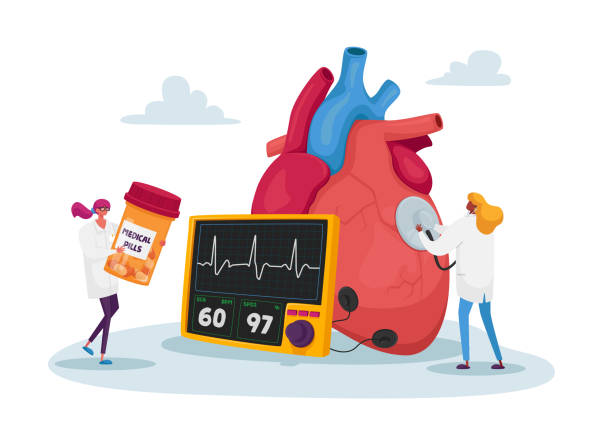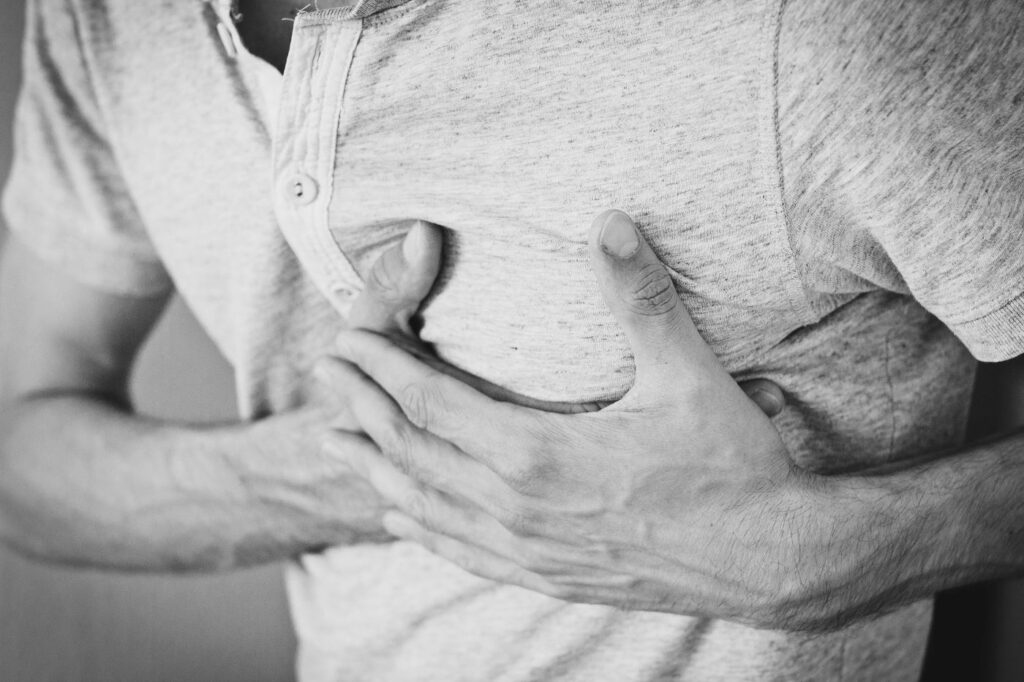Heart Health
Guide to Understanding Chest Pain Triggers
Chest pain is a sign that often causes immediate alarm, prompting people to seek medical help. Understanding the various causes of chest discomfort, on the other hand, is critical for selecting effective treatment options.
In this article, we will delve into the complexities of chest pain triggers, covering the wide range of circumstances that might cause this worrying symptom. We shed light on the various triggers that can cause chest discomfort, ranging from simple causes like heartburn and muscle strain to more serious problems like heart disease and pulmonary disorders. By unraveling the nuances of chest pain triggers, we hope to provide readers with the knowledge and awareness they need to effectively navigate potential symptoms and seek medical attention when necessary. Join us on a quest to uncover the mysteries of chest pain triggers and educate people to prioritize their heart health.

Common Causes of Chest Pain
Chest pain might indicate a variety of medical issues. Some causes of chest pain are minor and harmless, while others are potentially fatal. Here are some of the most prevalent reasons for chest pain.
Cardiovascular Conditions
Cardiovascular diseases are among the leading causes of chest pain. They include:
- A heart attack happens when the blood supply to the heart becomes obstructed, causing damage to the heart muscle. Chest pain is the most prevalent sign of a heart attack. Other signs include shortness of breath, nausea, perspiration, and pain in the arms, jaw, neck, or back.
- Angina is a type of chest pain caused by insufficient blood flow to the heart muscle. It is frequently characterized as a squeezing or pressure-like ache in the chest. Angina could indicate an underlying cardiac issue, such as coronary artery disease.
- Pericarditis is an inflammation of the lining surrounding the heart. Pericarditis symptoms frequently include chest discomfort. Other symptoms include a fever, tiredness, and shortness of breath.
- Aortic dissection is a tear in the wall of the aorta, the body’s biggest artery. Chest pain is the most prevalent sign of an aortic dissection. Other symptoms include abrupt, severe pain in the back or abdomen, difficulty breathing, and loss of consciousness.
Respiratory Issues
Respiratory problems might sometimes result in chest pain. They include:
A pulmonary embolism is when a blood clot becomes lodged in the lungs and blocks blood flow. Chest pain is a typical symptom of pulmonary embolism. Other symptoms include shortness of breath, coughing, and a fast heartbeat.
Gastrointestinal Causes
Chest pain can be caused by gastrointestinal issues, such as:
Heartburn is a burning sensation in the chest caused by stomach acid flowing back into the esophagus. It can induce chest pain, which might be mistaken for a heart attack.
Acid reflux occurs when stomach acid rushes back into the esophagus. It can induce chest pain, which might be mistaken for a heart attack.
Musculoskeletal Problems
Musculoskeletal disorders might also result in chest pain. They include:
Costochondritis is an infection of the cartilage that links the ribs and breastbone. It can induce chest pain, which might be mistaken for a heart attack.
Finally, a multitude of factors might induce chest pain.

Symptoms and Diagnosis
Chest pain can be caused by a range of illnesses, some of which are deadly. As a result, it is critical to recognize the signs of heart-related chest pain and seek medical assistance right away. Identifying non-cardiac symptoms can also aid in determining the underlying disease.
Recognizing Heart-Related Symptoms
Heart-related chest pain can feel like pressure, tightness, or a squeezing sensation in the chest. The pain may spread to the jaw, back, neck, and arms. Shortness of breath, lightheadedness, weariness, nausea, and dizziness may all accompany chest pain. These symptoms may signal a heart attack, and emergency medical assistance is required.
Identifying Non-Cardiac Symptoms
Non-cardiac chest pain can be caused by a number of factors, including gastrointestinal diseases, respiratory problems, and musculoskeletal concerns. The pain might be severe, stabbing, or scorching, and it may aggravate with certain motions or breathing. Other symptoms could include coughing, wheezing, or difficulty swallowing.
Diagnostic Procedures
If chest pain is considered to be heart-related, diagnostic tests may be required to discover the underlying reason. An electrocardiogram (ECG or EKG) can identify abnormal electrical activity in the heart. Blood testing can detect amounts of enzymes released during a heart attack. Imaging studies, such as a chest X-ray or CT scan, can assist in visualizing the heart and its surroundings.
If you have significant chest discomfort or other symptoms, you should seek emergency medical assistance right once. A quick diagnosis and treatment can assist in avoiding significant problems and enhance results.

Treatment and Management
Chest pain might be a sign of a dangerous medical issue that necessitates prompt treatment. The treatment for chest discomfort is determined by its underlying etiology and severity.
Immediate Actions for Chest Pain
If someone has chest pain, they should phone 911 or get medical assistance right once. It is vital to highlight that chest pain can indicate a heart attack, which requires immediate treatment.
Immediate actions for chest pain can include:
- Using nitroglycerin to relax the cardiac arteries and enhance blood flow
- Aspirin can help thin the blood and avoid blood clots.
- Antacids are used to treat acid reflux or heartburn.
- Using oxygen treatment to enhance breathing and relieve chest pain.
- Performing emergency operations, such as angioplasty or stent implantation, to eliminate a blockage in an artery leading to the heart.
Long-Term Treatment Strategies
Long-term treatment techniques for chest discomfort may vary according to the underlying cause and may include:
- Medications for high blood pressure, high cholesterol, or other cardiac disorders.
- Surgery for repairing or replacing damaged heart valves or blood arteries
- Lifestyle modifications, such as quitting smoking, decreasing weight, and exercising consistently.
- Cardiac rehabilitation can enhance heart function and lower the risk of future heart issues.
Lifestyle Modifications and Prevention
Lifestyle changes and prevention techniques may help to lower the risk of chest discomfort and other cardiac issues. This may include:
- Quit smoking and avoid exposure to secondhand smoke.
- Consuming a nutritious diet reduced in saturated and trans fats, cholesterol, and salt
- Exercise regularly and keep a healthy weight.
- Managing stress using relaxation practices like yoga or meditation
- Limiting alcohol consumption and avoiding illicit drugs
It is important to note that chest pain can be a sign of a serious medical condition and requires prompt medical attention. Individuals should speak with their healthcare provider about any concerns or questions regarding chest pain, risk factors, and prevention strategies.

When to Seek Emergency Help
Chest pain can be indicative of a significant medical issue. If you suffer any of the following symptoms, you should seek emergency medical assistance immediately:
- Chest discomfort that is abrupt, acute, or crushing
- Chest pain with shortness of breath, perspiration, or nausea.
- Chest pain that spreads to the arm, neck, jaw, or back
- Chest pain associated with fainting or loss of consciousness.
These symptoms could signal a heart attack, necessitating rapid medical intervention. If you suspect you or someone else is having a heart attack, dial 911 or go to the nearest emergency room straight away.
In addition to a heart attack, chest pain might indicate other dangerous medical disorders such as aortic dissection, pulmonary embolism, or pneumothorax. These diseases can result in chest pain, shortness of breath, wheezing, and other symptoms.
If you have chest discomfort and any of the following symptoms, get emergency medical assistance right away:
- Severe pressure or tightness in the chest
- Shortness or difficulty breathing
- Rapid or erratic heartbeat
- Dizziness or lightheadedness
- Vomiting or nausea
- Sweating or clammy skin
It is important to note that chest pain can also be a symptom of less serious conditions, such as indigestion or muscle strain. However, if you are experiencing chest pain and are unsure of the cause, it is always better to err on the side of caution and seek emergency medical attention.
Conclusion
To summarize, recognizing chest pain triggers is critical for properly managing and resolving this troubling symptom. Individuals can better understand the significance of their symptoms and take appropriate action by investigating the numerous variables that might cause chest pain, ranging from benign causes to potentially life-threatening diseases.
Whether it’s making lifestyle adjustments to reduce frequent triggers like stress or acid reflux, or seeking immediate medical attention for signs of cardiac or pulmonary problems, information is essential for promoting early intervention and protecting cardiovascular health. As we wrap up this article, let us emphasize the need for proactive monitoring, regular check-ups, and open communication with healthcare providers to ensure comprehensive care and well-being. By keeping watchful and aware, people may confidently manage the complexities of chest pain triggers and prioritize their health for a brighter, healthier future.
Trusted Health, Wellness, and Medical advice for your well-being



